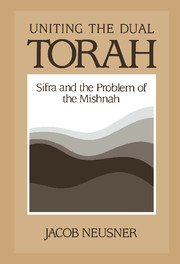Book contents
- Frontmatter
- Contents
- Preface
- Prologue
- 1 The Problem of the Mishnah
- 2 Torah as a Common Noun: The Solution of the Talmuds
- 3 A Sample of Sifra
- 4 From Common Noun to Proper Noun: Sifra's Re-presentation of the Two Torahs as One
- 5 Sifra's Alternative to the Mishnah's Topical Program and Its Order
- 6 Sifra's Alternative to the Mishnah's Logic of Cogent Discourse
- 7 Sifra's Alternative to the Mishnah's Proof of Propositions through Taxonomic Classification and Hierarchization
- 8 Re-presenting the Torah: Sifra's Rehabilitation of Taxonomic Logic
- 9 Torah as Proper Noun and the Structure of the Logic of Creation
- Appendix: The Distinctive Character of Sifra among Midrash Compilations
- Bibliography
- Index
4 - From Common Noun to Proper Noun: Sifra's Re-presentation of the Two Torahs as One
Published online by Cambridge University Press: 06 July 2010
- Frontmatter
- Contents
- Preface
- Prologue
- 1 The Problem of the Mishnah
- 2 Torah as a Common Noun: The Solution of the Talmuds
- 3 A Sample of Sifra
- 4 From Common Noun to Proper Noun: Sifra's Re-presentation of the Two Torahs as One
- 5 Sifra's Alternative to the Mishnah's Topical Program and Its Order
- 6 Sifra's Alternative to the Mishnah's Logic of Cogent Discourse
- 7 Sifra's Alternative to the Mishnah's Proof of Propositions through Taxonomic Classification and Hierarchization
- 8 Re-presenting the Torah: Sifra's Rehabilitation of Taxonomic Logic
- 9 Torah as Proper Noun and the Structure of the Logic of Creation
- Appendix: The Distinctive Character of Sifra among Midrash Compilations
- Bibliography
- Index
Summary
From Torah to “The” Torah
Sifra's relationship to Scripture may be characterized as the same as the Tosefta's or the two Talmuds' relationship to the Mishnah. Just as we can make no sense out of Tosefta without constant interchange with the Mishnah, so Sifra is unintelligible without the book of Leviticus, which supplies the document's structure, order, topic, and irreducible corpus of facts. It is at the fulcrum of Scripture, then, that our authorship undertakes to shift the Mishnah back into Scripture. That is how they restore to the common noun torah a single sense as a proper noun, even while exploring a broad new sense of what The Torah encompassed. The importance of the Mishnah, by contrast, is considerably diminished. Whereas we cannot have Sifra without the Mishnah, we do not interpret Sifra solely by appeal to the Mishnah. The reason is that, vis-a-vis the Mishnah in particular, Sifra makes an autonomous statement in its own name. In this respect it is in a different category from Tosefta, which is unintelligible without the Mishnah, and from the two Talmuds, which likewise appeal to the Mishnah for not only structure and order, but also topic and problematic. Those documents that serve as successors and continuators of the Mishnah and impute to the Mishnah the authority, standing, or classification of torah in no way stand as autonomous documents.
In order to move the Mishnah back into Scripture, the authorship of Sifra undertook a systematic and multilayered critique of the Mishnah.
- Type
- Chapter
- Information
- Uniting the Dual TorahSifra and the Problem of the Mishnah, pp. 72 - 80Publisher: Cambridge University PressPrint publication year: 1990



